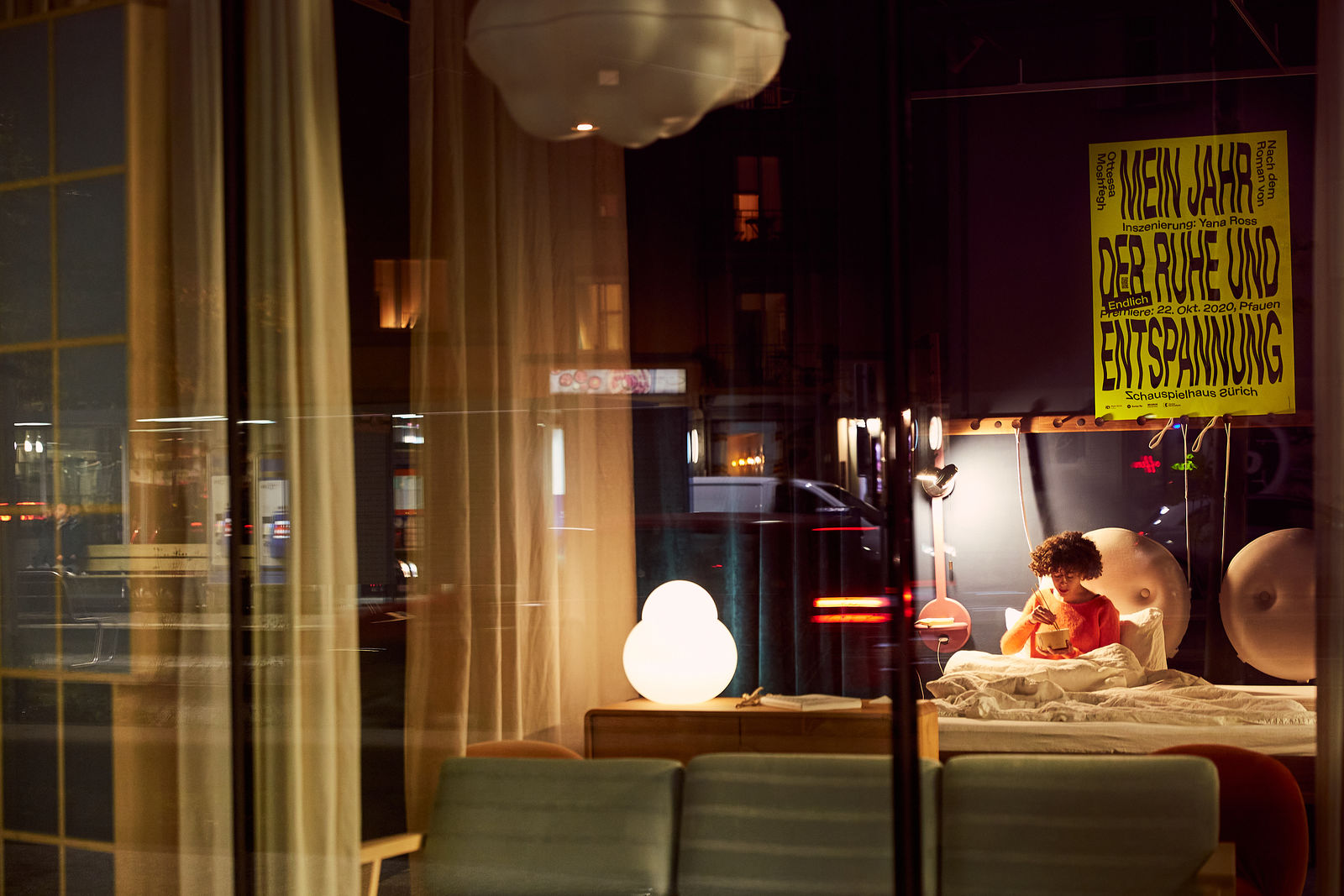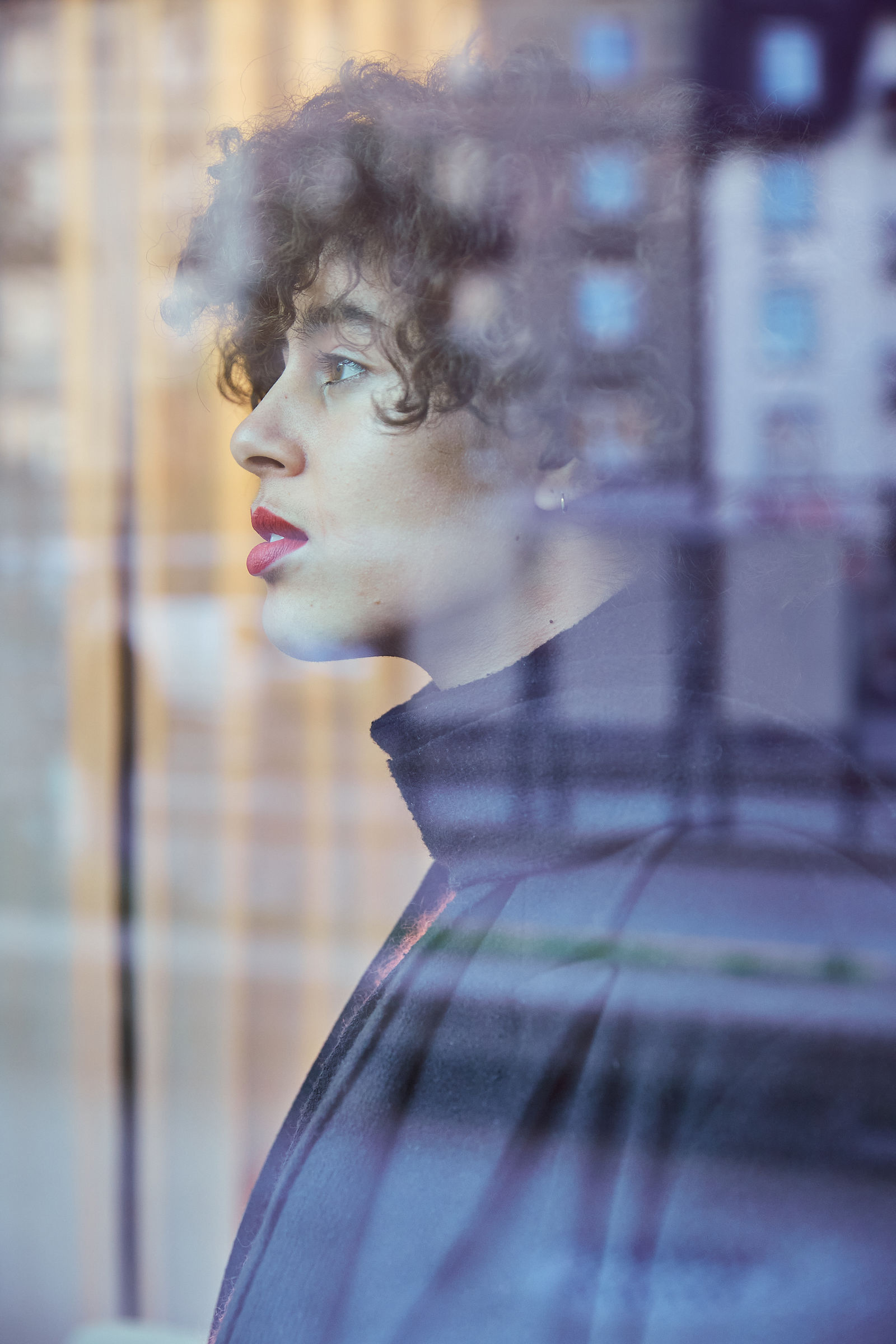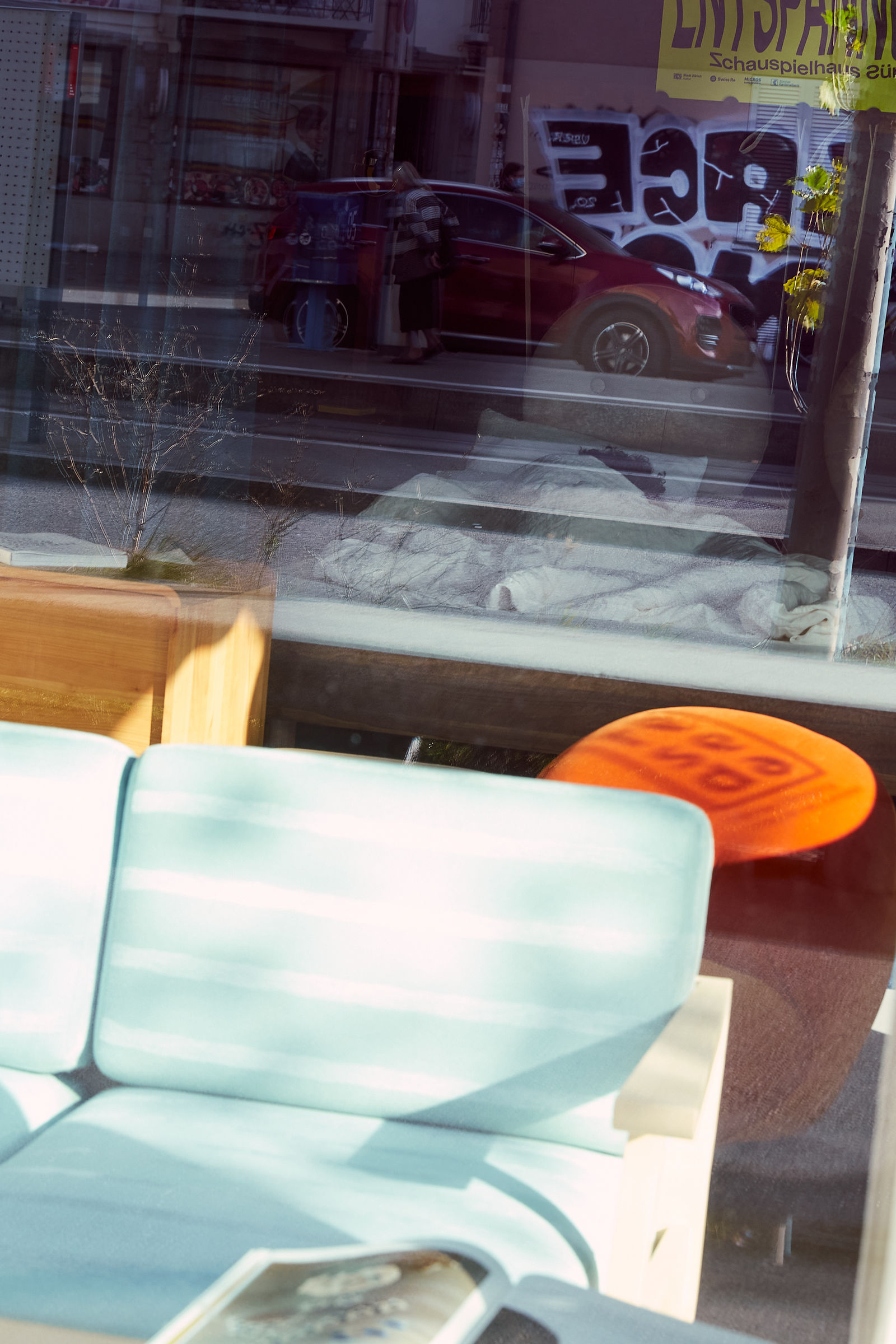My Day of Rest and Relaxation 1/3


Credits: Johanna Hullár
by Mathis Neuhaus
published on 19. November 2020
Retreating, getting out, pausing, refusing to participate. There are many ways to describe what you do when you do nothing. Would you sleep more if you could? Or less? Or not at all? We gave three people 24 hours to find answers to these questions. Alone, in a protected, but not entirely private place. Cassiane Pfund, an author based in Geneva, was one of the people reacting to the theatre's Open Call via Instagram. The following interviews circles around lockdown-experiences, privileges and the desire to avoid routines.
Mathis Neuhaus: What did and do your days look like during lockdown?
Cassiane Pfund: They look like resting a lot. Reflecting on the situation and writing when I can. I try to keep on writing for my own projects. But it’s not that easy to do it every day. Sometimes I have the impression that the world’s state is just taking too much space in my head for me to feel free to write. It is quite heavy. But there are also days I am going outside, going for a walk.
Mathis Neuhaus: Are there routines you try to keep up? Maybe writing is one of them?
Cassiane Pfund: I really try not to see it as a routine. I am scared that it could become automatic and that I would not be so conscious of what I am doing anymore. If you are brushing your teeth every day of your life, multiple times a day, maybe you are not that focused anymore when you are doing it – or at least not every time. So, I am really trying to, not necessarily make it special, but to be really present when I am doing it. I am not writing every day, but when inspiration comes to me.
Mathis Neuhaus: Do you, during these times, embrace to not do anything at all? Does it come easily to you?
Cassiane Pfund: Kind of. Especially now. It’s November, which is not my favorite month of the year, so I try to stay in bed anyways. I created a cabin out of fabrics in my room, it helps me to recreate a tiny world.
Mathis Neuhaus: The pandemic has been going on for a few months now. Have there been consequences on your profession or artistic practice? Economically, maybe, but also in regards to what you are writing and thinking about?
Cassiane Pfund: To be honest, during the first wave I was quite unable to write. I needed to finish a theatre play in the context of my diploma project and I was happy that I only had to make the last changes and polish it and not to write something new entirely. Even though I changed my mind about the play on the way, it was easier for me than starting from scratch, really. And then, when the first lockdown stopped in May, I actually started writing again, coming up with new ideas. There was something circulating inside of me again and I felt like: ‘Oh, maybe there might be new perspectives coming.’ As for my profession: I am done with my diploma now and I am supposed to find a job and of course, that’s hard. The cultural world is really affected and that is actually the tiny world I wish to work in. At the moment, I try to not think about it too much, because it’s making me quite sad. In Geneva, there are lots of alternative and cultural spaces that are suffering, some have been closed since Summer. I am both privileged and grateful for my parents that they are still supporting me, but if they were not, as I lost my on-call job as a direct consequence of the virus, I would be in a pretty precarious situation.
Mathis Neuhaus: When you said that during the first lockdown it was hard for you to come up with new ideas, do you see this pattern repeating itself right now?
Cassiane Pfund: It is hard, still. But I started new projects in Summer, so I feel like there is a spark. A tiny fire still burning inside. I can’t foresee yet how it will turn out. It is an interesting time, because it forces me to rethink the format of the book, too. I called a few publishing houses to get some information about their release schedules and plans for the upcoming months and a few of them told me that they were really late in planning their publication program. It leads me to ask myself whether I wish to write to be published one day and to reconsider the system as a whole. To get funds or to get residencies, you very often need to have at least something that was published. This system of validation is still really strong and powerful, it has a lot to do with the notion of ‘value’. I am trying to figure out what this means for my own work and to distance myself.
Mathis Neuhaus: Do you consider yourself a productive person? Or what do you make of the term “productivity”?
Cassiane Pfund: For me it almost is a political statement to claim that I do not want to be productive. It is interesting and something that I am reflecting on a lot during these days. A plan of mine is to set up workshops related to the theme of care. I really want to be focused on the process rather than only offering a final product or form or aiming towards a defined goal. There should not be any expectations, or at least not all the time. It is something that I am trying to get rid of, I can feel that I am pressuring myself quite a lot. Deconstructing this operating mode takes some time as I have the impression that it is very connected and rooted in the capitalist and production system we are living in.
Mathis Neuhaus: Giving things time is important.
Cassiane Pfund: That is the main ingredient. But it often is a privilege to have time, so this is also something that I am trying to question myself about.
Mathis Neuhaus: What made you reply to the theatre’s open call for a day of rest and relaxation?
Cassiane Pfund: You wake up every day and have routines. Of course, it depends on the type of person you are, but I guess I like to wake up and know, in some part of my mind and body, that I have something special and different to do. I am curious and felt tempted by the open call. I thought that it could bring new ideas and make it possible for me to reflect on things in a different way.
Mathis Neuhaus: Did the 24 hours you spend in Zurich feel different from 24 hours you would spend at home?
Cassiane Pfund: Of course, because the framing was different. I was wondering, because very often we feel the need to put things in a box and to label them accordingly, what I was doing, actually. Was it a job? A performance? Both? Am I really spending 24 hours in bed or am I performing to be spending 24 hours in bed?
Mathis Neuhaus: When I saw you after the 24 hours, it seemed like you were in a good mood.
Cassiane Pfund: The time I spent there made me realize even more that I am lucky to have a roof over my head at all times; when I need it. Being behind windows, I felt quite vulnerable. But I also saw people sleeping in the streets that night, which made me think about their vulnerability, too. Considering ‘rest’ as a possible healing process seems meaningful; it may help to reconnect with ouselves.
Mathis Neuhaus: We touched on this term a few times in our conversation already, but what do you make of the term “privilege”?
Cassiane Pfund: When you don’t have to think about something or experience it, it already puts you in a place of privilege. It is not a definition, but this is how I think about this term.
Mathis Neuhaus: Lastly: if someone would offer you money for sleeping as much as possible for a year, would you do it?
Cassiane Pfund: I would prefer this job for someone to have who needs it more.

Credits: Johanna Hullár
The following text was written by Cassiane Pfund during her 24 hours in Zurich. We publish it as an additional form of documentation, as an independent artistic work and as another form of contextualization.
24h00 de repos et de détente
Our wish: that you spend as much time as possible of the 24 hours in bed, best of all you sleep.
16h23.
Petit-Hôtel Reseda.
Les draps ont l’air doux.
Qu’est-ce que ça fait de dormir dans une chambre de catalogue?
Est-ce que le sommeil devient de catalogue?
Et le pyjama le devient-il lui aussi?
Est-ce que tout ce qu’on incarne dans cet espace ne devient pas, de fait,
une incarnation de catalogue?
Voici donc une documentation de catalogue.
16h36.
TROP SUPER ma tenue est assortie à la lunette des toilettes et au lavabo!
16h51
Dans une dame-jeanne, des fleurs séchées.
17h06.
Les vitres de la chambre sont celles d’un aquarium sans eau. Je ne sais plus qui est dehors et qui est dedans. Des gens passent, toutes sortes de gens.
C’est jeudi.
Les draps sont doux.
17h41.
Il y a longtemps, j’ai rêvé que j’étais un zèbre en captivité.
Au début, je regarde les gens en train de regarder et je me demande ce qu’ils fabriquent là, leur face collée contre la vitre. Je pourrais moi aussi coller ma face en face de la leur, pile en face, créer le trouble.
Les gens qui passent sont d’autres zèbres en captivité.
19h12.
Si un jour tu croises un ours, fais la morte.
Je me fais toute petite dans le lit en pensant aux stratégies de défense qui reposent sur l’immobilité.
NE PLUS MÊME CLIGNOTER DES PAUPIÈRES !
19h30.
Je mangerais bien un sandwich.
20h35.
Les draps sont tachés de soupe miso.
Je ne sais pas faire susuru.
Demain, je prendrai un sandwich.
20h45.
Dans le lavabo rose, du dentifrice.
21h03.
"Les enfants naissent trop tôt. Après neuf mois dans l’utérus, le développement est insuffisant. On commence notre vie avec une absence d’autonomie extrême par rapport aux autres mammifères. […] Il faudrait passer 21 mois dans l’utérus. […] Quand on y réfléchit, tous les enfants naissent prématurés. Pour pallier le déficit de croissance intra-utérine, les adultes […], la société, agissent pendant des années comme […] une couveuse humaine."1
21h24.
On dirait qu’on a banni le repos du GRAND PROGRAMME!
Qui est ce on?
Pourquoi est-ce qu’on a honte de la trêve?
Pourquoi est-ce qu’on a de la peine à dire STOP quand on a besoin de se
reposer?
Et pourquoi, si on parvient à l’exprimer, l’estomac se crispe par crainte de se fainéantiser et/ou d’être catalogué·e·x panosse desséchée?
Le droit au repos et à l’hibernation devrait être inscrit dans la Constitution!2
21h30.
Je n’ai jamais uriné dans de si jolies toilettes.
L’odeur du savon m’obsède.
21h55.
Dehors, une personne dort sur un banc.
22h01.
Est-ce que si tout le monde avait le privilège de pouvoir se reposer en
sécurité et au chaud, on aurait moins honte?
Est-ce que j’aurais moins honte?
22h32.
Quand je dors dans un lit pour la première fois, IL FAUT QUE JE ME ROULE DEDANS!
22h35.
Est-ce qu’un sommeil exposé peut être profond?
Quelle sera la profondeur de mon sommeil?
Mein Jahr der Ruhe und Entspannung fait-il office de couveuse humaine?
22h58.
Coups contre la vitre.
23h05.
Je vérifie : porte fermée à clé.
Les rideaux coulissent autour du lit.
Préserver une intimité.
07h15.
Les rideaux coulissent autour du lit.
Soleil.
Des gens passent, toutes sortes de gens.
C’est vendredi.
07h34.
C’est la deuxième fois que j’urine dans de si jolies toilettes.
L’odeur du savon me rappelle celle d’un ancien amant.
Dans le lavabo rose, du dentifrice.
08h09.
En face, Istanbul.
08h15.
L’idée d’être une voisine d’en-face temporaire dans un aquarium sans eau nez-à-nez avec un salon de coiffure nommé «Istanbul» m’est délicieuse. L’idée d’être un zèbre en captivité temporaire dans un aquarium sans eau nez-à-nez avec un salon de coiffure nommé «Istanbul» m’écoeure.
?h?.
Regarder l’heure fait frein à une suspension nécessaire au repos.
Plus tard.
Pas de sommeil continu, des assoupissements.
Et entre, des faces contre les vitres, des poissons aux rideaux et des
nouilles sur ma langue.
Il n’y avait pas de sandwich.
Plus tard que plus tard.
Appuyer sur le distributeur de savon.
Encore.
Et encore.
Pour me souvenir un peu.
Dans le lavabo rose, du dentifrice.
Plus tard encore que plus tard que plus tard.
Faut-il allumer les lumières en plein jour?
C’est un magasin.
J’AI DORMI DANS UN MAGASIN!
Un jour, les zèbres deviendront dipneustes.
Les draps étaient doux.
1 La Trajectoire des Confettis, de Marie-Ève Thuot, p.89.
2 Si quelqu’un·e·x ne l’avait pas encore dit, quelqu’un·e·x devait le dire.